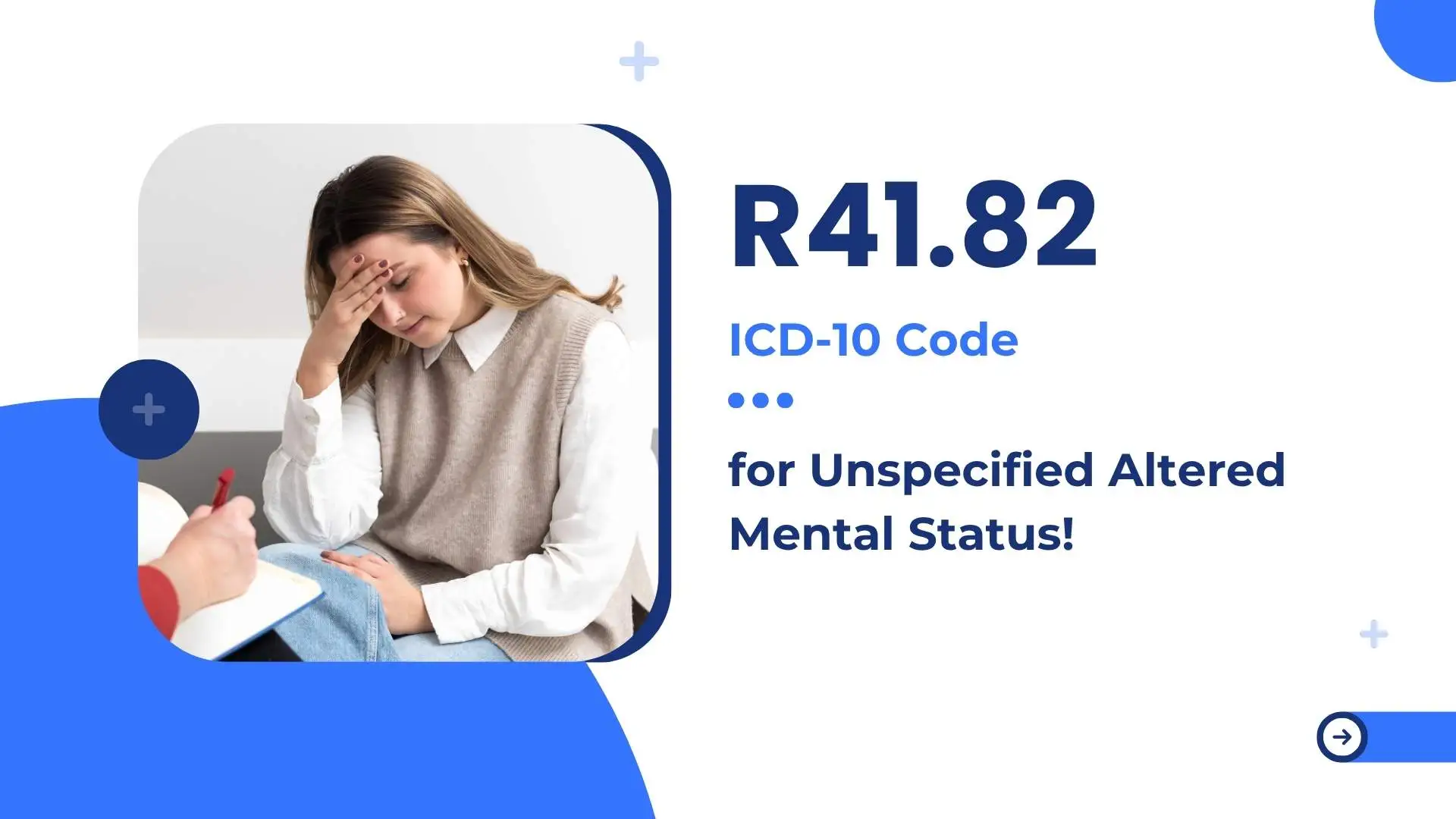In clinical practice, few symptoms are as urgent and require immediate workup as a sudden change of mental status. These signs of confusion or disengagement, strange behavior, often indicate something that should be managed more medically. These cases are often documented using the R41.82 ICD-10 code “Altered mental status, unspecified.”
In this article, I cover everything you need to know about ICD-10 altered mental status diagnosis coding, its clinical concerns, and its place in wider diagnostic systems.
What is R41.82?
The ICD 10 code of AMS unspecified (R41.82) is intended to be utilized in cases when cognitive disturbances of a person have not been associated with any diagnosis. This is usually done when a patient is brought in with a confused state, a reduced level of consciousness (ICD-10), loss of memory, or when they exhibit unknown behaviors.
Unlike other psychiatric or neurologic diagnoses, R41.82 ICD-10 is a placeholder code – a way to know that there is an alteration of mental status present as evidence but requiring further assessment. It falls under ICD-10 Chapter 18: “Symptoms, signs and abnormal clinical and laboratory findings that don’t fit into other categories”
When should I use the ICD-10 Code AMS (R41.82)?
The ICD 10 code for altered mental status is most commonly recorded in the emergency room, hospital inpatient departments, urgent care centers, or in the case of ambiguity in patient presentation, as:
- Unexplained confusion or disorientation
- Unexplained agitation or lethargy
- Hallucinations or paranoia without prior history
- Fluctuating awareness and cognition
- Behavioral disturbances in elderly patients
In these cases, clinicians may consider infectious processes, drug reactions, some kind of trauma, or stroke; however, in the absence of certainty, R41.82 is the most suitable code. This is also frequently captured as the primary symptom during the rest period in testing or clinical observation.
Clinical Examples of R41.82 ICD-10 Use
Think of a scenario where an elderly gentleman is brought in by his family for confusion and increased sleepiness. Upon arrival, there is no clear stroke, infection, or other metabolic imbalance.
The care team orders labs and a CT scan and monitors vitals. During this window, the ICD code for confusion – R41.82- reflects the active symptom.
Another scenario could involve a trauma patient with no visible head injury but exhibiting slurred speech and poor awareness. Until tests rule out severe neurological damage, the ICD-10 code AMS unspecified becomes a critical billing and documentation tool.
Differentiating R41.82 From Other AMS Diagnosis Codes
While R41.82 covers the umbrella of unspecified cognitive changes, it’s important to distinguish it from other, more specific AMS diagnosis codes, including:
- ICD 10 R41.0 – Disorientation
- ICD 10 code for forgetfulness – R41.3
- ICD 10 hypertensive encephalopathy – I67.4
- ALOC ICD 10 – Often used as another name for altered level of consciousness and is closely related to code R41.82.
- Mental illness ICD 10 codes – Typically fall under Chapter 5 (F-codes), e.g., psych diagnosis codes for schizophrenia, bipolar disorder, etc.
- Mental disability ICD 10 – Codes like F70-F79, used for intellectual disabilities rather than acute AMS
Accurate code selection ensures the precise assignment of DRG 448 and appropriate reimbursement. Claim denial or audit red flags can arise from the inappropriate use of specific codes, such as R41.82, due to defaulting to generic codes.
Signs and Symptoms of Altered Mental Status
Signs and symptoms of AMS may be either mild or severe. These changes in health can concern professionals and people looking out for someone’s health if there is
- Confusion and disorientation
- Memory impairment or forgetfulness
- Hallucinations or delusions
- Unusual drowsiness or hyperactivity
- Mood or behavioral change
- Reduced reaction to stimuli
These symptoms may come on quickly (like in a seizure or a stroke). They may also appear or develop over days, usually as a result of infection or drug side effects.
In cases where altered mental status prompts the need for psychological evaluation, understanding the differences between CPT codes 96130 and 96131 becomes essential for accurate test billing and documentation.
Common Causes Behind AMS and Relevant ICD-10 Codes
Although R41.82 does not specify a cause, it is often an indicator of a serious medical issue. Common causes include:
- Toxicology: F10- F19 code drug overdose (alcohol or any other)
- Neurologic events: Seizure (G40), Stroke (I63.9), traumatic brain injury (S06)
- Metabolic imbalances: E16.2 for hypoglycemia and E87.1 for hyponatremia
After diagnosing a specific cause, caretakers are expected to stop using the 82 code and replace it with a more appropriate ICD-10 code that better describes the condition.
Role in Documentation and Reimbursement
The ICD-10 code AMS must be documented as soon as possible to ensure the appropriate treatment and coordination of care, as well as reimbursement by an insurance company. This is important, particularly with claims covered by DRG 448 (Medicare Severity Diagnosis-Related Group of specific nervous system disorders). The AMS cognitive symptoms are able to justify the service level and the hospitalization period.
In your documentation, always include:
- Symptom description, such as the patient presents with acute confusion and disorientation.”)
- Onset and duration
- Associated symptoms or suspected causes
- Testing ordered or pending results.
- Monitoring plan or next steps
This level of clarity supports the necessity of using the AMS dx code and signals to payers that further evaluation is ongoing.
Transitioning From R41.82 to a Definitive Diagnosis
While R41.82 is a critical starting point, it should not remain in the patient’s chart once a definitive diagnosis is made. If you identify the underlying cause of mental status alteration, then update the record accordingly.
For example:
- If it turns out to be a stroke, replace with I63.9
- If due to drug overdose, apply the proper F10–F19 code.
- If they are psychiatric, then choose psych diagnosis codes, including F29 (unspecified psychosis)
Proper coding improves patient care, supports accurate epidemiological tracking, and ensures compliance with healthcare regulations.
AMS in Elderly and Special Populations
In geriatric medicine, altered mental status ICD-10 coding is particularly significant. The acute ALOC ICD 10 symptoms are observed in many elderly patients because of the urinary tract infection, dehydration, or even excessive medications. Such cases, however, may be similar to chronic cases like dementia, which should be coded carefully.
Also, in ICU or trauma contexts, AMS ICD 10 unspecified would serve as a clinical anchor to manage high-risk patients while awaiting confirmatory diagnoses.
Final Thoughts!
ICD-10 code R41.82 altered mental status, is not merely a doctor code but a phrase to state, something is not right, and we need to determine why.
When a person gets confused, forgetful, or behaves in a different way, this code assists medical teams in figuring out what is incorrect. Whether it leads to ICD 10 hypertensive encephalopathy, a mental illness ICD 10 code, or a psych diagnosis code, it all starts with noticing the change and using R41.82 properly.
In short, R41.82 is a starting point that directs patients in the right direction. So, even though it may look like “just a code,” it plays a big role in saving lives and guiding treatment.




